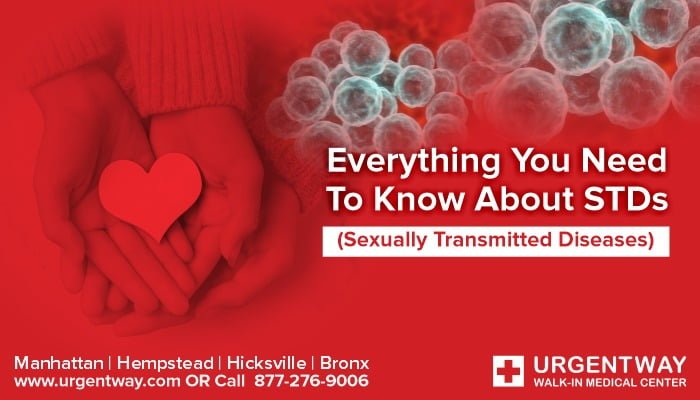Sexually transmitted diseases are infections passed from one person to another person through vaginal, anal, or oral sex. It is also known as sexually transmitted infection (STI) or venereal disease (VD). Bacteria, viruses, and parasites cause sexually transmitted diseases. According to an estimation, approximately 25% of Americans are experiencing incurable sexually transmitted diseases (STDs). These sexually transmitted diseases are common among people 15 to 24 years of age and can have long-term consequences.
Significant causes of sexually transmitted diseases
There are the following significant causes of sexually transmitted diseases:
i. Bacteria
These bacteria are primarily responsible for sexually transmitted diseases such as Chlamydia, gonorrhea, and syphilis.
ii. Viruses
The viruses that trigger sexually transmitted diseases are HIV/AIDS, herpes simplex virus, human papillomavirus, hepatitis B virus, cytomegalovirus (CMV), and Zika.
iii. Parasites
Following parasites are also responsible for having sexually transmitted diseases such as trichomonas vaginalis, or insects such as crab lice or scabies mites1.
Symptoms of sexually transmitted diseases
There are different symptoms of sexually transmitted diseases in males and females, such as the following:
Symptoms of sexually transmitted diseases in males
Men may experience the following symptoms of sexually transmitted infections:
- Burning and itching in the penis
- Discharge from the penis
- Pain around pelvis
- Burning and pain during bowel movement
- Excessive urination
- Bumps, blisters, and sores on the penis, anus, or mouth
Symptoms of sexually transmitted diseases in females
Women may experience the following symptoms of sexually transmitted diseases:
- Burning and itching in the vagina
- Discharge from vagina
- Unusual bleeding from the vagina
- Pain during sex
- Bumps, blisters, and sores on the vagina, anus, or mouth
- Burning and pain with urine discharge
- Excessive urination
- Pain around the pelvis
Common sexually transmitted diseases
The following are the most common sexually transmitted diseases:
- Chlamydia
- Human papillomavirus
- Syphilis
- HIV
- Public lice
- Trichomoniasis
- Genital Herpes
- Gonorrhea
- Scabies
- Genital warts
Risk factors
Exposure to STD infected person via sex is the primary cause to have sexually transmitted diseases, but some risk factors increase this risk, such as:
Having unprotected sex
Anal or vaginal penetration by an infected person who is not wearing a latex condom significantly increases the risk of getting the sexually transmitted disease.
Sexual contact with multiple partners
The more people you have sexual contact with, the greater your risk of getting the sexually transmitted disease. Monogamous consecutive relationships also trigger this risk due to a series of partners at a time.
Forcefully sexual activity
Forcefully sexual intercourse as rape and assault is at higher risk of sexually transmitted diseases due to a lack of hygiene, care, and condom.
Being young
Being young is the major risk factor for having sexually transmitted diseases. Half the STIs occur in people between the ages of 15 and 24. This is due to the peak emotional age, lack of knowledge, and pleasures of sexual contact.
Effects of sexually transmitted disease
Effects of sexually transmitted diseases arise in the form of health complications. People who are suffering from the STDs may have to experience the following complicated effects such as:
i. Pelvic Inflammatory disease
Sexually transmitted diseases such as gonorrhea and Chlamydia may cause Pelvic Inflammatory disease in women. Severe lower belly pain and pelvic pain are the symptoms of it.
ii. Pregnancy complications
Untreated STDs may lead to pregnancy complications such as premature birth, premature rupture of the membranes, and low birth weight of the fetus.
iii. Arthritis
Gonococcal arthritis is a rare complication of the STD gonorrhea. It caused joint pain and inflammation, resulting in joint pain and stiffness.
iv. Heart disease
Chlamydia infection is closely linked with heart complications. Chlamydia employs a sneaky tactic known as “molecular mimicry” that triggers an autoimmune response in the victim and eventually leads to inflammation of the heart.
v. Eye inflammation
Chlamydia and gonorrhea are significant causes of eye inflammation diseases. The infection gets into the eyes directly as semen fluid or indirectly when the victim rubs the eyes after touching genitals.
STDs are passed from one infected person to another when they come close to sexual contact. The responsible microbes are viruses, bacteria, and parasites, which cause STDs. The major sexually transmitted diseases are Chlamydia, human papillomavirus, syphilis, trichomoniasis, genital herpes, gonorrhea, and Chlamydia. Risk factors such as age also trigger to have STDs. These diseases damage our reproductive system rather than cause other health problems such as eye complications, heart diseases, arthritis, and Inflammatory pelvic diseases.
UrgentWay offers quick, accurate, comfortable, and affordable STD screening. Our highly trained staff ensures your comfort before starting STD screening.



